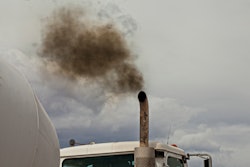Have you ever had the pleasure of making a long-haul trip in the heart of summer without properly working air conditioning in your semi-truck? If not, let me tell you that it is not fun and makes for an uncomfortable drive.
General maintenance work on a truck’s HVAC system is important to increase the lifespan of AC parts and reduce the chances of downtime. To see if your truck’s ac unit is in good standing, you will first need to know the warning signs of failing parts, the common causes of a broken AC and the main parts to fix it.
Warning: your AC is about to fail
Hot air blasting through the vents is the typical sign of a failing air conditioning system. The blast of hot air is often accompanied by a squealing noise, and even an unpleasant odor. These occurrences are the most common warning signs of failing HVAC systems, but what causes them?
Warm air blasts – It could mean that you have a failing AC condenser, evaporator or compressor. Condensers convert gasses into liquids and if they get clogged or blocked, they will not be able to perform as intended. “When the condenser is bad, heat doesn’t distribute properly, and your unit will only blow out warm air,” says JIT Truck Parts blogger Jeremy Handel. The AC evaporator could also be freezing up. The AC evaporator is responsible for providing cold air for air conditioning systems but if evaporator coils leak, the cooling capacity is reduced and will blow warm air throughout the cabin. [Leaks are caused by corrosion inside the evaporator core or from damage to the outer seal on the evaporator core.] Finally, “compressors need to pump refrigerant to cool the air. If your compressor doesn’t pump refrigerant, then it will only blow warm air.” If poor airflow persists, replacing these AC parts is necessary.
Rattling and squealing noises – Where the squealing is coming from will depend on the type of AC unit in the truck. Newer AC units typically do not have fan belts. For older models that do, it is best to check for slipped or misaligned belts on the motor that could cause the squealing sound. The noise could also be from worn AC condenser bearings. AC condenser fans are attached to a motor that create rotation. Bearings inside the motor often wear out over time, and when they do they create a high-pitch noise. A buildup of refrigerant pressure within the AC compressor could cause unusual noises too.
Bad smells – The environment can play a nasty role in why your AC unit smells bad. Odd smells coming out of the vents could be from a buildup of debris, including mold and mildew growing in the evaporator. If the unit smells bad, you need to get the evaporator coils and air filters replaced in a hurry so you aren’t breathing in these contaminants.
AC inspection tips
AC compressors, evaporator coils, condensers, valves and filters will need to be inspected to ensure a cool drive cruising into summertime.
To avoid problems, you will want to perform the following maintenance tasks:
• Refrigerant leaks from hoses, O-rings, compressors and evaporators are common reasons for failing AC systems. Remember to look underneath the vehicle for leaks and tighten hose fittings to prevent leakage. Perform a dye test if you aren’t sure where a leak is coming from. They are often used by professionals to check for leaks and can be done by applying a small amount to the refrigerant.
• You could recharge the system. If performing this task, you’ll want to “locate and open the low-pressure valve, then attach the refrigerant to the valve and charge from there. Ensure you use the right refrigerant type and amount, as specified by a manufacturer. It is possible to overcharge the AC, so consider seeking help from a mechanic.”
• Check system sensors and broken switches. If the high-pressure switch is malfunctioning, it could lead to air flow disturbances that won’t be able to detect whether the right amount of refrigerant is flowing through the system.
• Failing expansion valves, orifice tubes and clutches can lead to malfunctioning compressors. Damaged hoses and seals can lead to trouble with condensers. Don’t neglect inspecting other smaller parts.
When it is 95°F outside, the last thing you want is for your truck’s AC system to fail. Fix failing AC parts now to avoid uncomfortable long-haul trips this summer.
Jennifer Smith is an e-Commerce Digital Content Specialist at JIT Truck Parts in Highland Park, Illinois.











